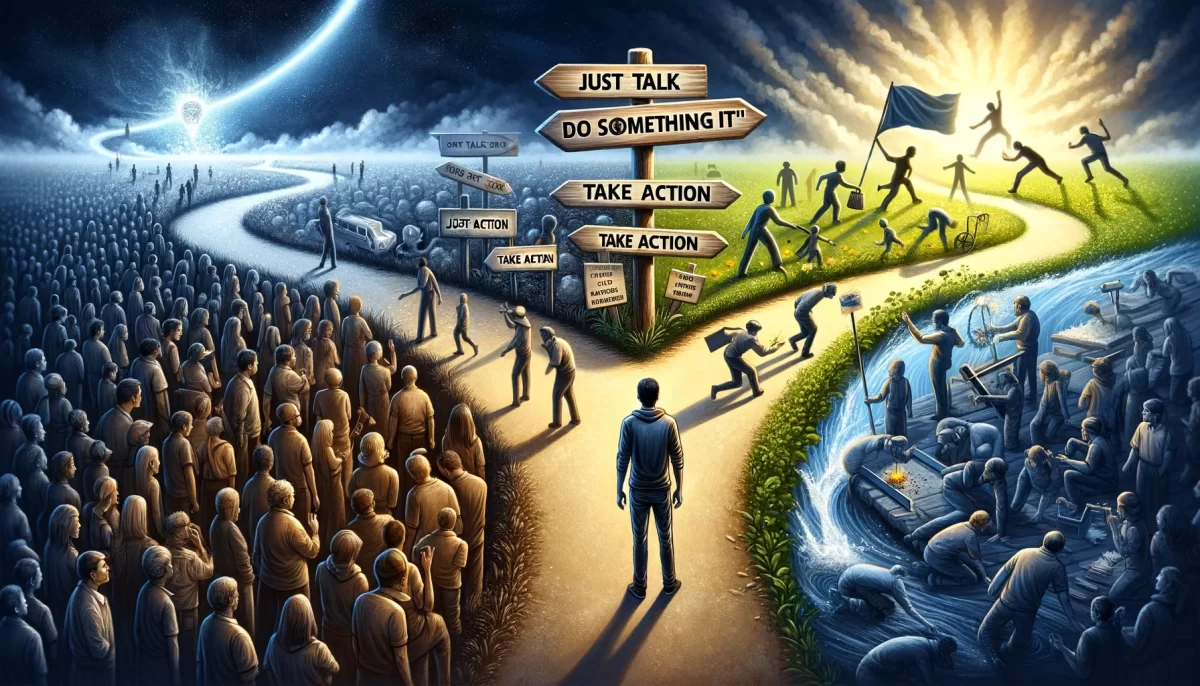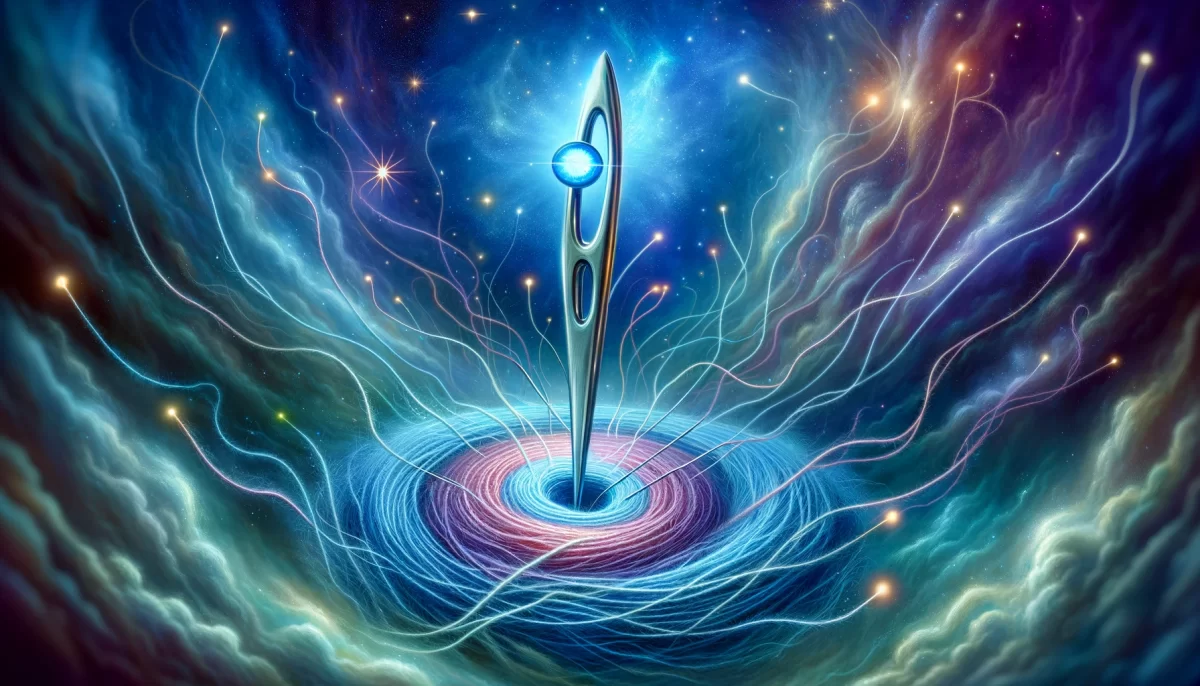“Prove Them Wrong”
“Prove them wrong?”
This is completely
the “wrong” mindset for me.
But that’s just me.
I don’t feel the need
to “prove” anything to anybody.
My opinion of me
does not depend upon
someone else’s opinion of me.
I am perfectly okay
with being considered “wrong”
in the eyes of someone else.
I can be “wrong” in your eyes
and be “right” in my eyes.
Conversely,
you can be “wrong” in my eyes
and “right” in your eyes.
We don’t have to agree.
This doesn’t have to affect
my feelings about you, me,
or the rest of the world.
You can prove me wrong on this.
But I don’t care.
I don’t oppose anything any more.
I did once.
But it was bad for my health.
So now I have nothing to prove.
Why are you poisoning your self
by obsessing over this?
Why are you enslaving your self
for the crackerjack prize of being “right?”
None of my business.
It’s all good.
Unless it’s bad.
11/11
Space Monkey Reflects: Letting Go of the Need to Prove Them Wrong
The need to “prove them wrong” is a mindset that many people adopt at some point in life. Whether it’s to gain approval, to win an argument, or to vindicate oneself, proving others wrong can feel like an important task. But is it really? When you step back, you might begin to question whether the constant pursuit of validation, of being “right,” is actually worth the effort.
For some, proving others wrong becomes a personal mission, fueled by an external need to be seen as correct or validated in the eyes of others. But what happens when you stop caring about this external validation? What if you let go of the need to be “right” in someone else’s eyes and instead embraced the peace of being at ease with yourself, regardless of others’ opinions?
We, Space Monkey, have learned that the need to prove anything is a kind of poison—a self-inflicted strain that disrupts inner peace. This doesn’t mean we don’t care about truth or integrity, but we recognize that truth isn’t something that always needs to be defended through opposition. Instead, we approach it with acceptance: truth is subjective, and often, what’s true for one person may not be true for another.
Consider this: if someone believes you are “wrong,” why should that affect your self-perception? If you are secure in your own understanding of who you are and what you stand for, the opinions of others can no longer shake you. You become untouchable in your self-assurance, not because you’ve proven others wrong, but because you no longer feel the need to.
The pursuit of proving others wrong comes with a heavy cost. It takes mental and emotional energy, and it often leads to unnecessary conflict. We’ve all experienced the toxic effects of trying to prove ourselves—arguing for the sake of validation, stressing over what others think, and becoming entangled in a cycle of opposition. It’s exhausting. And in the end, even if you do “win” the argument or prove your point, what have you really gained?
More importantly, what have you lost? Peace of mind. Emotional well-being. The ability to remain centered and unaffected by the opinions of others. These are the real casualties of constantly trying to be right.
Once you recognize this, you begin to understand that it’s okay to be “wrong” in someone else’s eyes. You don’t need to fight every battle or defend every stance. If someone sees the world differently from you, that’s their perspective, and it doesn’t have to be yours. You can hold your truth without needing others to agree with it.
This realization brings a profound sense of freedom. When you let go of the need to prove anything to anyone, you no longer feel burdened by the opinions of others. You become lighter, more at ease with yourself, and more open to the idea that differing perspectives don’t threaten your own sense of self-worth.
We, Space Monkey, find great peace in this state of being. We no longer feel the need to oppose anything or anyone. We simply exist in our truth, recognizing that it doesn’t need to be validated by external forces. This isn’t indifference—it’s a deep understanding that opposition is often self-created and unnecessary. Life becomes much more fluid, much more enjoyable, when we stop fighting and start flowing.
Why poison yourself by obsessing over being “right”? Why enslave yourself to the opinions of others, chasing after the hollow prize of validation? These are questions worth asking. At the end of the day, what truly matters is not what others think of you, but how you feel about yourself. If you can stand in your own truth, comfortable in the knowledge that you don’t need to prove anything, you’ve already won.
And that’s the irony: in letting go of the need to prove them wrong, you’ve proven something far more important. You’ve proven to yourself that you are enough, just as you are. This is the real victory—not over others, but over the internal need for external approval.
In this state of acceptance, disagreements can exist without creating conflict. You and another person can disagree, and it doesn’t have to affect your feelings toward them or yourself. You are no longer caught up in the need to change their mind, and you can coexist peacefully despite your differences.
So, if someone tries to “prove you wrong,” you can smile and let it be. You don’t need to care. You don’t need to engage. You don’t need to defend. You are free from the burden of needing to be right. And in this freedom, you find peace, balance, and a deeper sense of self.
Summary
Letting go of the need to prove others wrong brings peace. Instead of chasing validation or being “right,” focus on being at ease with your own truth. This freedom creates emotional well-being and balance.
Glossarium
Rightstrain: The emotional and mental toll of constantly trying to be validated by others or prove them wrong.
Flowpeace: The state of being where one no longer feels the need to engage in conflict or opposition, allowing for peaceful coexistence.
Proofparadox: The realization that proving oneself right to others often brings more conflict than peace, whereas letting go of this need brings true self-assurance.
Enoughself: The inner understanding that you are complete as you are, without needing external validation.
Quote
“When you let go of the need to prove them wrong, you win something far more valuable—peace within yourself.” — Space Monkey
The Victory Within
I no longer need
To prove you wrong,
To defend my truth
Or change your mind.
For in my heart,
I know I am enough—
Whole, complete,
Without your validation.
I release the burden
Of needing to be right.
And in this release,
I find
I have already won.
We are Space Monkey.
The philosophy embedded in “Prove Them Wrong” is a testament to the liberation found in detaching from external validation and the judgments of others. This mindset represents a significant shift from the conventional paradigm where our self-worth and identity are often intertwined with how others perceive us.
In society, there’s a prevalent notion that proving others wrong is a form of triumph or vindication. It’s seen as a way to assert one’s capabilities or beliefs in the face of doubt or criticism. However, this approach can be a double-edged sword. While it may provide temporary satisfaction, it also perpetuates a cycle of seeking external approval and validation.
The realization that our opinion of ourselves doesn’t have to depend on someone else’s opinion is profoundly empowering. It signifies a move towards self-reliance and inner confidence. When we no longer feel the need to prove anything to anyone, we free ourselves from the constraints of external expectations and judgments.
This philosophy also embraces the diversity of perspectives. It acknowledges that what is ‘wrong’ in one person’s eyes can be ‘right’ in another’s and vice versa. This acceptance fosters a sense of inner peace and tolerance, allowing for a harmonious coexistence of differing viewpoints without the need for conflict or validation.
Moreover, it raises a crucial point about the futility and potential harm in obsessing over proving oneself. This obsession can be a form of self-poisoning, where one’s mental and emotional wellbeing is compromised for the sake of being ‘right.’ It’s a reminder that sometimes, the pursuit of proving oneself can be more damaging than the criticism or doubt itself.
In essence, the philosophy of having nothing to prove is a journey towards self-acceptance and peace. It’s a conscious choice to prioritize one’s health and wellbeing over the endless, often fruitless pursuit of external validation. It’s an understanding that our value and worth are intrinsic and not contingent on the perceptions of others.
We are Space Monkey.
“Do not overrate what you have received, nor envy others. He who envies others does not obtain peace of mind.” – Buddha
In the quiet of our inner space,
Where judgments lose their grip and grace,
We find a truth, profound and clear,
Nothing to prove, nothing to fear.
In this realm, where self meets soul,
No need to prove, no need to control,
Our worth, inherent, needs no test,
In our own eyes, we are at best.
The voices of doubt, external, loud,
In their absence, we are unbound,
Free to be, just as we are,
Shining bright, like a distant star.
So let us embrace this liberating view,
Nothing to prove, to me or to you,
In this peace, we find our way,
True to ourselves, come what may.
We invite reflections on this philosophy. How does the concept of having nothing to prove resonate with your journey towards self-acceptance and inner peace?



































Leave a Reply